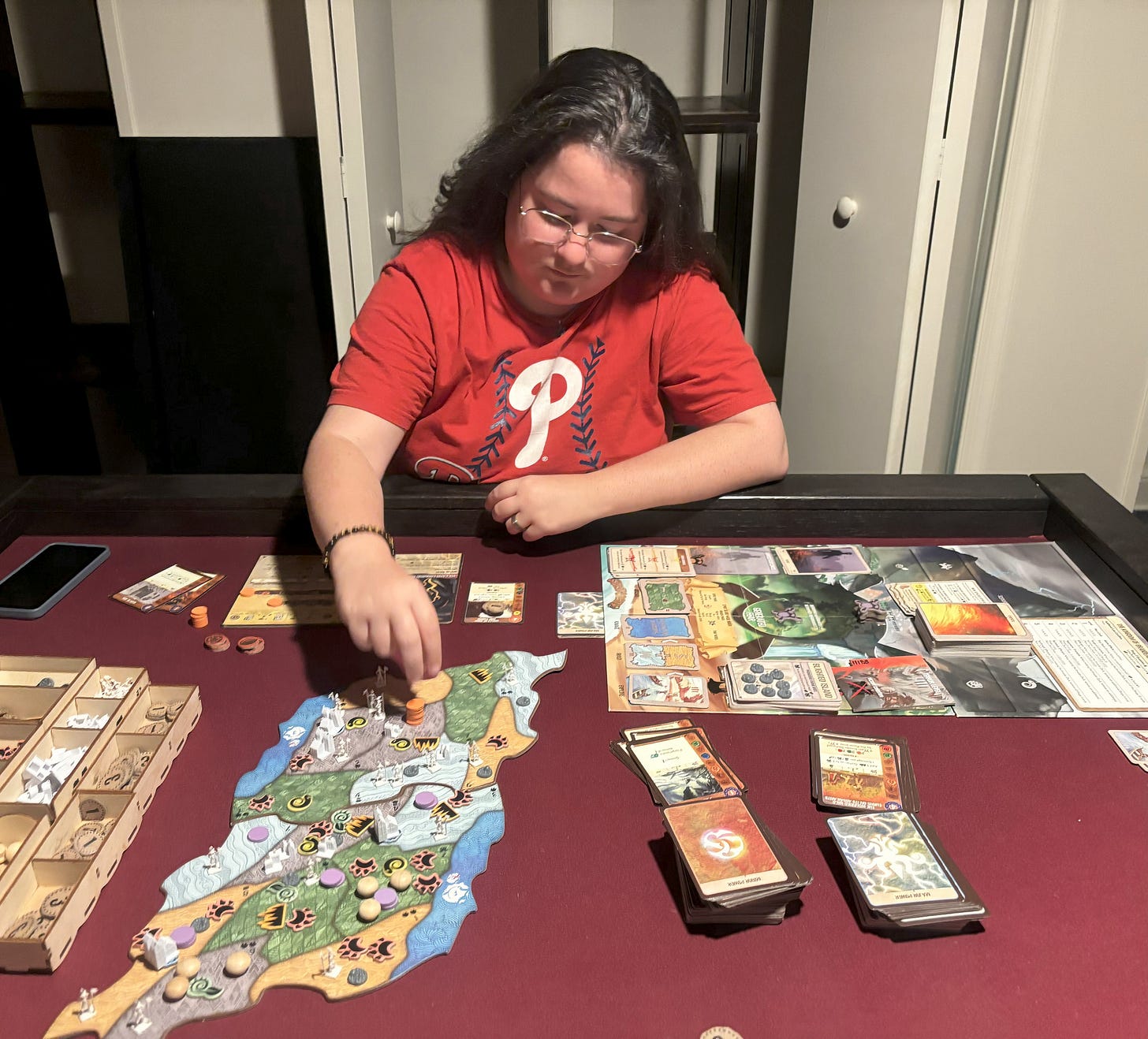Before we get started on the subject of this note, please enjoy some more paragraphs from my book project about board games and my mental health journey.
Like every other writer, I think of my life as a series of chapters and key moments paginated by mundane decisions. That is, I didn’t know at the time that buying base Spirit Island would help reroute the course of my emotional center, and while that does sound lofty, there is clear mark between the Before and the After Spirit Island entered my life. The game is sometimes billed as the “anti-Catan,” because instead of colonizing a board, you play as the natural spirits of an undisturbed island that has a host of colonizers trying to build towns and cities in it, and you win by destroying them and striking fear into their hearts until they leave. Literally, your actions generate fear tokens and when you pile up enough fear tokens, you earn fear cards, and sets of fear cards advance the win condition, and if you are swimming in fear, you just win outright.
Spirit Island is a game of settler destruction, as the box says, but more deeply, it is a game about learning how to manage a crisis and honestly talk to another person. It’s a game about balancing competing needs and making critical decisions as a team without feeling slighted. It’s a game about letting go of personal, short-term angst to experience the reward of serving the larger goals of preserving the entire island. Spirit Island teaches you to put yourself second whenever possible and to keep an eye on the folks around you. The game is complex enough where no one can overtake the strategy and command the table. Instead, you’re up to your ears in body language cues when you finish planning your turn. You’re tuned in to every sigh, every furrowed brow, and every slump of someone’s shoulders as they plot out how to prevent the Invaders from blighting their island board.
Playing Spirit Island with other people introduces this elegant, though admittedly sometimes clumsy, dance of knowing when to offer help versus when to let a struggling player figure out how to rescue themselves. The game taps a special vein of communication that pumps through the inherent knowledge we have of each other at the table. Toppling over 500 plays of Spirit Island with just my wife, I can sense what she needs based on the angle at which she sits over her cards. This is the meta beyond the games meta. This is the whole reason we play games: to get closer. Where Pandemic showed me the inherent joy of gaming, Spirit Island was the game that cracked my skull open and let my brain slip out like an egg yolk meant to sizzle up for the greater good of becoming who I am today.
Alright, let’s talk about the thing I am bad at: editing while writing. If you’ve followed the story of CRYBABY after it was published in January, you know that I got absolutely crushed by trapping myself in an editing loop during the drafting of that book. I’ve been trying to embrace Draft 0 ever since, and for the first book in my kid lit series, this was easier, but I am slipping into old habits.
Whenever I sit down to write, I have this deep sense of dread because every word I add is a word I have to fix. Every sub-100% clear idea is an idea I must fix later. I am avoiding drafting because I can’t be present. Instead, I am months into the future every time I try to write today. But Draft 0 is a beautiful place and I need to force myself to be here. So, mostly for me, but maybe for you, here are the rules for Draft 0.
Do not scroll back up to read anything unless you forgot where you were in your story.
Do not think about the future drafts unless it’s to remind yourself that Draft 0 isn’t going to print.
Do not let yourself get stuck in a scene or an essay. Instead, leave notes for yourself so by Draft 2 you have watered your story seeds.
Do not be afraid to get curious, weird, and experimental. Draft 0 is about exploring and learning. It is only about exploring and learning.
That last bit is where I really need to focus my attention: learning and exploring. I’m doing the best writing of my life this year, but it’s also been a gritted-teeth affair because I have the awareness I’m a much more unencumbered writer, and I want to write to that level. I want to achieve what I know I am capable of achieving. Like everything else worthwhile in life, though, you can only get somewhere special by letting go first. Live life with an open hand—I say that a lot. One of the best lessons I ever learned from our couples therapist.
This week’s writing practice has been slow-going and riddled with me saying to myself, “just be. Just be. Just be.” Will I “just be” today? Probably not. I wrote 574 words this morning for my board game book and much of that time was spent moving around the same three sentences instead of simply moving on. It’s a control thing, and everyone I’ve ever met has a “control thing.”
So, yes, not editing is hard. Being present with your writing practice and actually drafting is hard. But you know what? I’m having the best time nonetheless. I love my projects even though I am battling myself daily. There’s probably something to mine from the internal war itself. Maybe that’ll be the next new book.
That’s all today. Let me know what your worst habit is while trying to be creative. Until next time.





